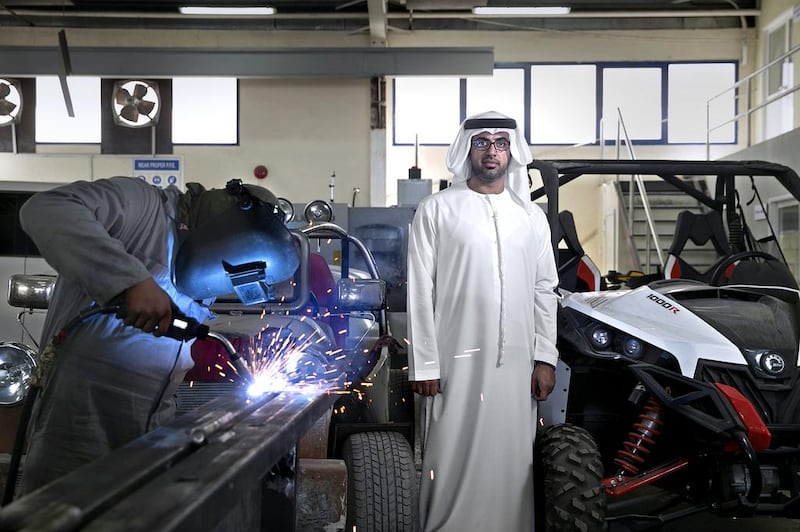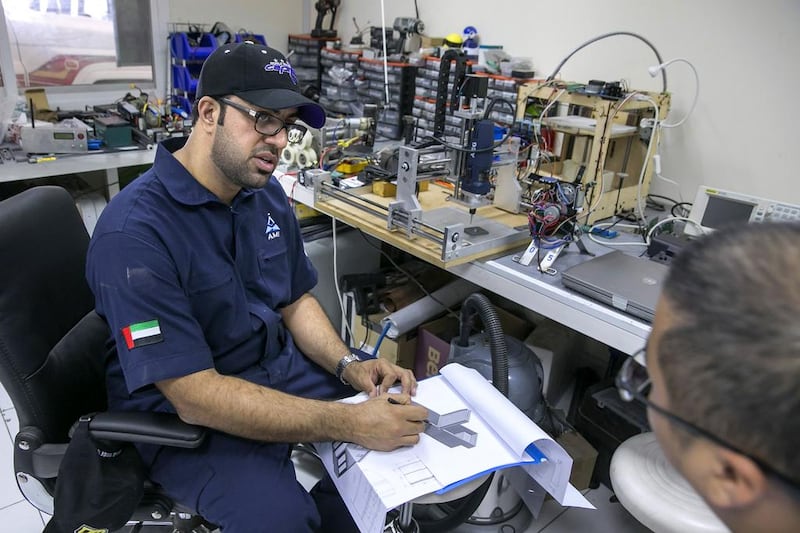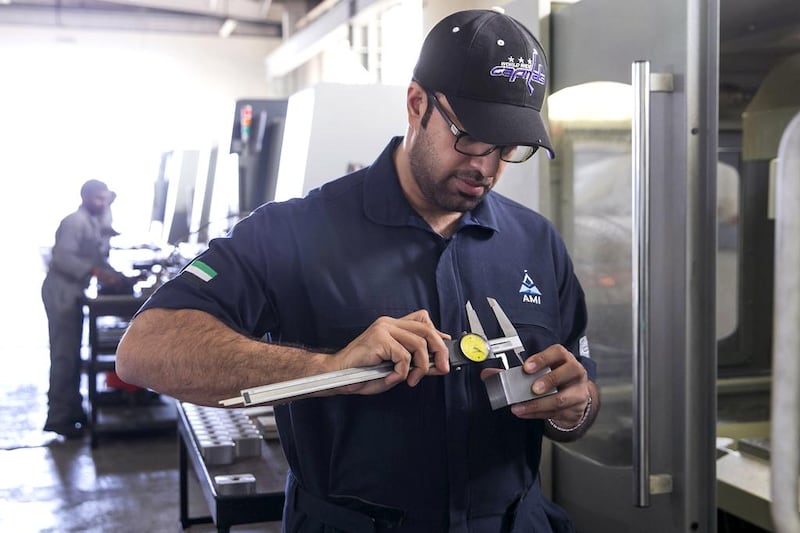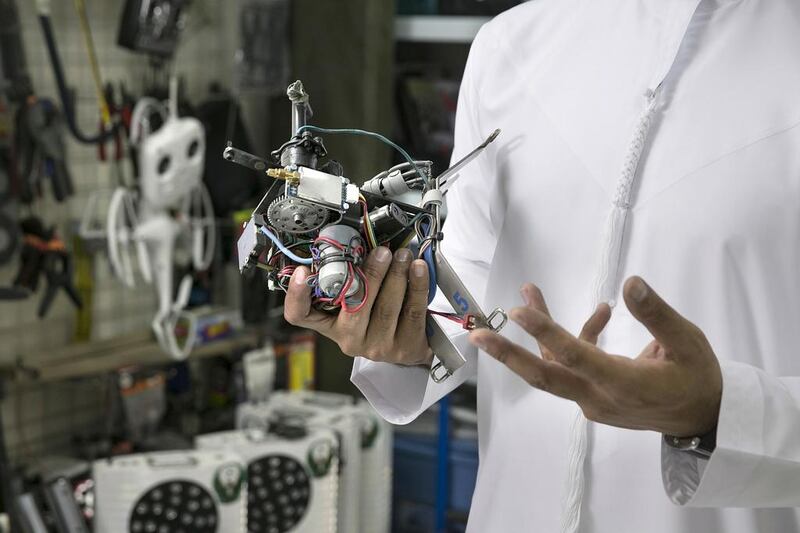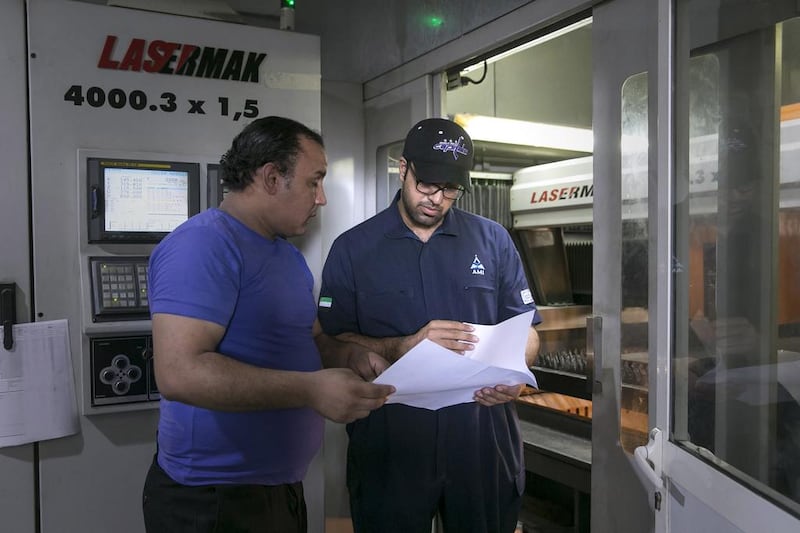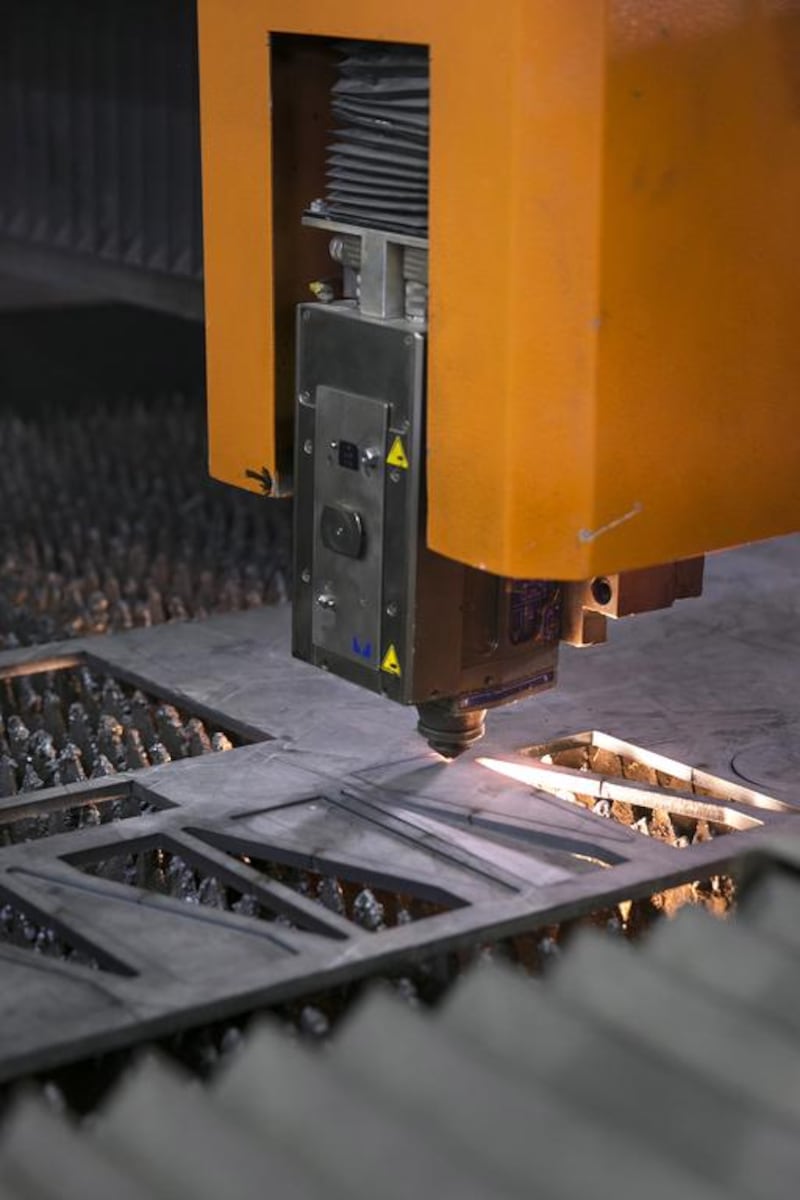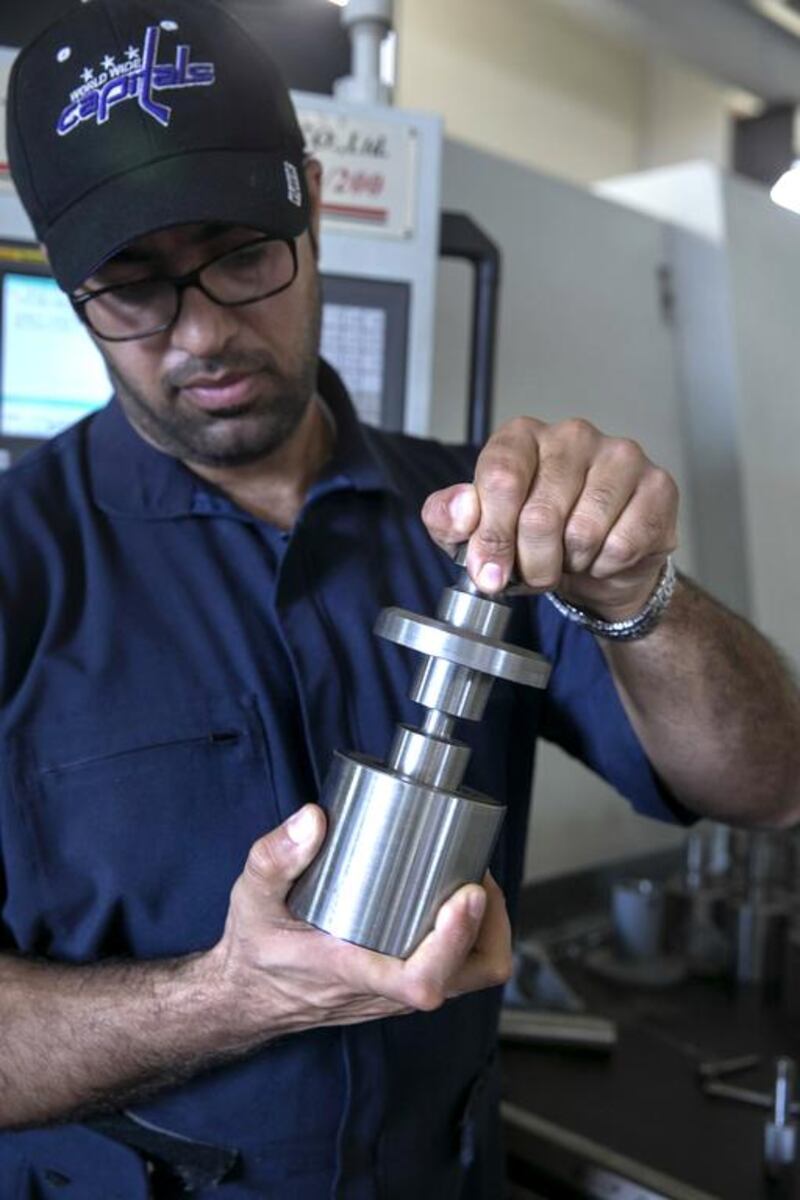To highlight a critical area for our country’s development, in February we had asked you to nominate your top innovators in the SME space by email, Twitter, Facebook or Instagram, using the hashtag #UAEinnovators.
The feedback we received was overwhelmingly positive and a string of individuals have been written about in The National, including the Sharjah graduates who let you wear your memory on your wrist, the group helping you to turn your junk into robots, a start-up launching an Uber-like app for loadless lorries and Dubai's version of "Google for retail".
These are the ambitious entrepreneurs and business owners creating and developing the new ideas, concepts and technologies that will change our lives. The government has also tagged 2015 as the Year of Innovation as it seeks to boost the diversification of the economy via new technologies and applications.
Today we present The National's top innovator, Ahmed Al Mazroei, an Abu-Dhabi based inventor and businessman, who with little formal training is developing problem-solving technology every day including an automated falcon training system that preserves the lives of small birds and the lightest, most advanced robot camel jockey, developed to help its owners win races. He was nominated by the Khalifa Fund for Enterprise Development.
The nameplate on Ahmed Al Mazroei’s desk simply designates him as “inventor”. Although he is the chief executive of Ahmed Almazroei Metal Industries, at heart he is and has always been an inventor rather than a businessman.
A large corner of the desk is awash with blueprints and designs. The cabinet against one wall shows the string of awards he has won for his inventions.
A gold medal for his camel racing robot from the International Invention Fair hosted by the Kuwait Science Club in 2010. Another gold for his device for falcon training at the same event the following year. First place in UAE achievers competition 2009.
The 1,500-square-metre factory in Mussaffah this Monday morning is a hive of activity — workers weld, cut, fix and assemble as sparks fly amid machinery, pickup trucks and dune buggies.
Industrial machines lathe, laser cut and bend metal.
Tucked away is his “playroom”, the lab where he spends so much of his time turning his many ideas into reality.
Time is an inventor’s most precious commodity, the 34-year-old says. “If you can give me more time I will pay for it.”
He first caught the inventing bug when he was seven years old in Ajman, where he grew up and developed an early fascination for cars and all things mechanical.
The modern car, with its electronic, mechanical and design elements, was the perfect training ground for him. He is self-taught, never having attended university formally.
In 1999 he developed a prototype for a car, what he calls the SBC — a 550 horsepower “sport, buggy, car” capable of speeds of up to 220 kilometres per hour and able to traverse any terrain.
He built it and in 2001 took it to have it registered as roadworthy in Ajman. It failed to pass inspection. He did not give up and made the necessary alterations to the design, and in 2004 the SBC had a Dubai number plate.
In 2004, a law was passed restricting camel races to using robot jockeys instead of children. With the support of Sheikh Humaid bin Rashid, Ruler of Ajman, Mr Al Mazroei invented a robot jockey for camel racing. He sold about 360 robots across the region over two years, bringing in about Dh3 million in sales, he says.
There are two distinct periods for Mr Al Mazroei in his career as an inventor. The days before securing support and then after winning wholesale official support from branches of the government.
The first era is almost more important. Inventors must learn how to develop their ideas to at least the prototype stage on their own, he says.
“Do the work,” he says. “Being an inventor is not about having an idea. Anyone can have an idea.
“Don’t wait,” he says. “Not for support, not for anything. Don’t sleep on an idea.”
He has seen too many talented people fail to develop an idea before the competition and he has received too many requests for help from those who do not want to sweat.
Many more have come to him looking for support. He is ready to help anyone who has the willingness to turn their idea into a reality.
He has given people the parts they need and is ready to support them with money, he says. Often it is just about giving direction, a helpful tip on the next step in the process.
“3D printers, for example. I have one, and if someone needs a mould I will print it for them,” he says, remarking that the technology is a game changer for industry.
“Already the technology is there to print metal parts.”
He regularly visits colleges, schools and universities to speak with students and show them that there are successful inventors working in the country.
Little time is spent online or reading. He finds that his best ideas come after a ride to Dubai on his Harley-Davidson or a day spent scuba diving. His mind works out a problem then he is ready to get back into the lab.
“My work is my family,” he says, remarking that he gets so caught up working in his lab that he can lose track of time. “If I didn’t wear my watch, sometimes I will be here all night.”
According to James Dyson, the inventor and billionaire entrepreneur, the biggest challenge comes when others do not agree with your vision.
“When I first invented the bagless vacuum cleaner I decided to show my design to some of the major vacuum cleaner manufacturers in the UK to see if they were interested. I was laughed out the door,” he says.
“As a young inventor, perseverance, even against the odds, is fundamental to success.”
His company now sells household products across 72 markets worldwide and has a 25-year pipeline of new technology.
“It is vital that young inventors have support early on in their careers,” says Mr Dyson, who believes in giving responsibility and autonomy to young designers at his company, allowing them to learn from their mistakes and develop their abilities.
When I visit the factory for the second time the following Monday, Mr Al Mazroei says he has been up most of the night working on an urgent project for a government customer. The deadline is 8pm that same day. Yet he is full of energy regardless and cannot be more generous with his precious time.
He picks up again on the thought that there are two distinct phases in his career — the period before he attracted support from the government and the current one.
“Before, my ideas were all personal. I would look at the market, see where the gaps were and come up with a solution. Now I’m helping customers solve their problems and develop their ideas.”
Previously he would spend too much time labouring on a proof of concept. Now thanks to the support he has received, he has the machinery, team and investment to develop an idea quickly.
Before, he was on his own tinkering away in a small lab in Ajman. Now he has among his 100-member staff at his premises in the capital a research and development team of about seven who can help him turn an idea into a reality.
The government’s support has given him more time. “Alone all I had was ideas, now they are a reality,” he says. “Today the development process is much faster.”
Individual inventors need the government, and equally the government needs individual inventors. Together they can achieve what neither side can do alone.
“In the end the government is backing an individual’s ideas, something they connect with, more than the individual,” he says.
In 2013, with the guidance of Sheikh Saif bin Zayed, Minister of Interior and Deputy Prime Minister, Mr Al Mazroei approached the Khalifa Fund for Enterprise Development to help turn his small workshop into a commercial-scale industrial manufacturing and R&D business.
It gave him support including a Dh5 million loan, which he topped up with Dh7m of his own money, and the fund helped open the door to getting his first contracts. It also took him on visits to Italy and China to gain more insight into how to make his business a success.
He began repaying the loan to the Khalifa Fund this year.
Mr Al Mazroei is a prime example of a successful entrepreneur who shows his commitment to his business by insisting on “attending and leading all the meetings pertaining to his company and refusing to rely on employees to manage day-to-day operations”, says Mouza Obaid, Khalifa Fund’s acting chief operational officer.
He has also encouraged other Khalifa Fund members to get involved in his project, says Ms Obaid.
Mr Al Mazroei’s ability to invent and develop robots, drones, electronics and machinery is helping the UAE spend its R&D money more efficiently. Not only is he able to give his customers what they want at a lower cost relative to an international company, but he is able to develop ideas based on the particular environment of the UAE. “The heat is not like Europe. You can get 50°, 52° days. It is not just the weather but also the desert is a unique environment here,” he says.
One of his inventions, a drone soldier able to go on scouting missions, is going through weeks of testing in the desert. It weighs 500 kilograms, can traverse mountain terrain silently and has a four-hour battery life.
Between 2005 and 2013 there have been seven evolutions of his camel jockey robot, developed with investment from Sheikh Humaid and then later the different branches of the government. Mr Al Mazroei declined to give details of the exact amount of investment required, but it ran into the millions of dirhams.
The latest version will be ready soon, he says. He shows model No 5, smaller and more electronic than the very mechanical original that sits near by in his lab. Versions 1 to 4 sit idly on shelves, almost forgotten. They could be the inspiration for a future Pixar movie.
His vision is for his company to become AMI Group from next year. He has installed managers at his five different business units, each of which, once they scale, will be spun off to a dedicated site. He is already exporting his fire-rated steel doors to Saudi Arabia, Qatar and Kuwait and expects to begin delivering products to international markets beyond the Gulf.
His other businesses include laser cutting, metals, parts and his R&D unit, which drives invention for the whole group.
The unofficial motto of AMI Group is teamwork. “What I always tell my staff is one hand, one family, one company. Without a laser operator, without an electroengineers, I can’t do anything. It takes six to seven minds to think through one idea.”
A trawl through the internet reveals a number of international patents filed by inventors based in the UAE for a range of applications, from a super-flexible shisha pipe to miniature aircraft that clean buildings to a method for detecting and monitoring concealed bodies. But they amount to dozens rather than hundreds or thousands of inventions.
According to the World Intellectual Property Organization (Wipo) 2.35 million applications were made for international patents in 2012, of which more than half were made in Asia. More than 40,000 were made in India and more than 2,220 in Egypt. There were 272 filings in the UAE in the same year and this number almost doubled to 416 in 2013. The top applicants in 2013 were the Khalifa University of Science, Technology and Research and the Masdar Institute of Science and Technology, according to Wipo.
“An astonishing 85 per cent of economic growth is because of innovation, new products and new ways of doing things, rather than simply increases in inputs such as capital, labour and energy,” says Bruce Walker Ferguson, the head of the Masdar Institute Center for Innovation and Entrepreneurship.
Mr Ferguson says that one of the most important ways to support innovation is to create a culture of innovation. A key feature of such a culture is “a recognition that whether or not innovation provides short-term financial benefits, it inevitably creates a valuable reserve of entrepreneurs, product developers and other participants, a tremendous educational benefit of unusual breadth and depth”.
The third time I go back to see Mr Al Mazroei he is dressed in his overalls working the machines that line one side of his factory. As he gauges their progress, he speaks with his staff, working through any issues that come up.
“Even when he is with you he is thinking about the problem that needs to be solved,” says Hilal Al Baloushi, the head of Mr Al Mazroei’s electrical division and a long-time friend.
“He amazes us,” says Mr Al Baloushi of his chief executive’s creative ability.
It is the day after Mr Al Mazroei has been recognised as Entrepreneurial Personality of the Year at the eighth Mohammed bin Rashid Award for Young Business Leaders in Dubai at a ceremony this month in the presence of Sheikh Ahmed bin Saeed.
“I am very proud,” he says. “This is a recognition of all the work I have done since the beginning.”
He takes this as proof that he is at last a businessman as well as an inventor.
malrawi@thenational.ae
Follow The National's Business section on Twitter
